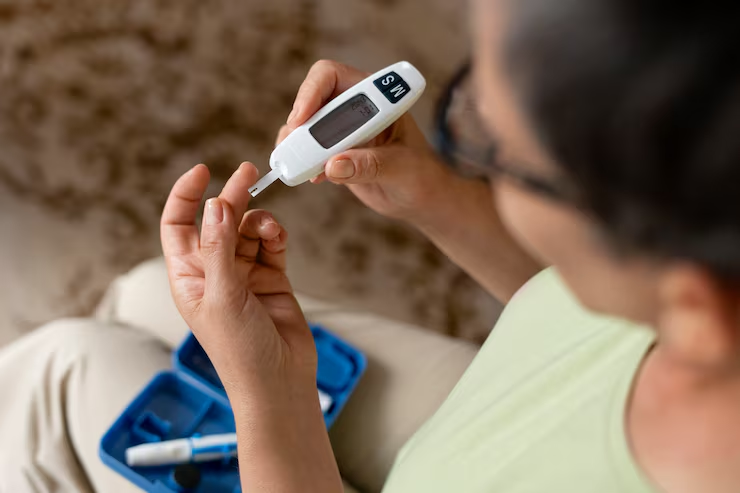Maintaining blood sugar levels for adults within a healthy range is one of the most important aspects of overall health. Blood sugar, or glucose, is the primary source of energy for the body, and keeping it balanced ensures that your organs function optimally. Imbalances in blood sugar levels can lead to serious health issues, such as diabetes, heart disease, and kidney problems. Understanding how to monitor and control your blood sugar can empower you to make informed lifestyle choices that promote long-term wellness. 🌿
In today’s fast-paced world, dietary habits and sedentary lifestyles have made it increasingly difficult to maintain ideal blood sugar levels for adults. Consumption of processed foods, sugary beverages, and lack of physical activity can lead to blood sugar spikes and dips, impacting energy, mood, and metabolic health. Awareness of what constitutes normal and abnormal blood sugar readings is crucial for adults of all ages. By learning the science behind glucose management, individuals can prevent long-term complications and enhance their quality of life. 💪
Moreover, lifestyle changes, including nutrition, exercise, and stress management, play a critical role in maintaining blood sugar levels for adults. Regular monitoring, understanding glycemic indices, and adopting health-conscious routines can help individuals maintain balanced glucose levels effortlessly. With the right strategies, adults can enjoy sustained energy, mental clarity, and improved physical health. This article will provide a comprehensive guide to understanding, managing, and optimizing blood sugar levels for adults, including actionable tips backed by research and practical advice. ✅

What Are Blood Sugar Levels for Adults?
Blood sugar levels for adults refer to the concentration of glucose present in the bloodstream. Glucose is a simple sugar derived from carbohydrates and serves as the body’s main energy source. Normal blood sugar levels vary slightly depending on the timing of measurement, whether fasting, post-meal, or random checks throughout the day. A healthy adult usually has fasting blood sugar between 70-99 mg/dL, while levels above 126 mg/dL may indicate diabetes. 🩺
Understanding blood sugar levels for adults is critical because glucose fuels vital organs like the brain, heart, and muscles. An imbalance can lead to hyperglycemia (high blood sugar) or hypoglycemia (low blood sugar), both of which can pose serious health risks if not managed effectively. Adults with consistently abnormal blood sugar levels are at a higher risk of developing type 2 diabetes, neuropathy, cardiovascular disease, and vision problems. Regular monitoring and awareness are essential steps toward long-term health.
The factors affecting blood sugar levels for adults include diet, physical activity, stress, sleep, and certain medical conditions. Foods rich in refined sugars cause rapid spikes, while fiber-rich foods stabilize glucose. Exercise helps the body utilize glucose efficiently, reducing excess blood sugar. Understanding these factors enables adults to maintain optimal blood sugar levels for adults and enjoy a healthier lifestyle. With the right knowledge and tools, managing blood sugar becomes less daunting and more achievable. 🏃♂️
Why Maintaining Blood Sugar Levels for Adults Is Important
Maintaining healthy blood sugar levels for adults is vital for preventing chronic diseases and ensuring overall well-being. High blood sugar can damage blood vessels, nerves, and organs over time, leading to severe complications such as heart disease, kidney failure, and stroke. By keeping blood sugar within a normal range, adults can significantly reduce these risks and enjoy a better quality of life. ❤️
Proper management of blood sugar levels for adults also supports mental clarity and energy levels. Sudden spikes or drops in glucose can cause fatigue, brain fog, irritability, and difficulty concentrating. Adults who maintain stable blood sugar experience enhanced cognitive function, improved mood, and sustained physical energy throughout the day.
Another reason to focus on blood sugar levels for adults is weight management. High blood sugar levels are often linked to insulin resistance, which can lead to obesity. Controlling glucose levels through diet, exercise, and lifestyle habits helps maintain a healthy weight, improves metabolism, and reduces the risk of metabolic syndrome. With the right strategies, adults can maintain balanced blood sugar, prevent chronic illnesses, and enjoy long-term wellness. 🌟
Effective Ways to Maintain Blood Sugar Levels for Adults
Balanced Diet 🍎

Maintaining a balanced diet is crucial for regulating blood sugar levels for adults. A diet rich in whole grains, lean proteins, healthy fats, and fiber ensures gradual absorption of glucose, preventing sudden spikes. Complex carbohydrates such as oats, brown rice, and whole wheat provide sustained energy and help stabilize glucose. Including fresh vegetables and low-glycemic fruits like berries or apples also supports healthy blood sugar levels for adults. Avoiding processed foods, sugary snacks, and sweetened beverages is essential, as these can lead to rapid increases in blood glucose and long-term health issues.
A balanced diet also involves pairing macronutrients wisely. For example, combining protein or healthy fats with carbohydrates slows digestion and glucose absorption, which helps keep blood sugar levels for adults within an optimal range. Adults should aim for consistent meal timings and avoid skipping meals, as irregular eating patterns can cause blood sugar fluctuations. Incorporating portion control and mindful eating practices further supports glucose stability.
In addition, dietary planning for adults should include hydration and micronutrient-rich foods. Vitamins and minerals, such as magnesium, chromium, and vitamin D, play a role in improving insulin sensitivity and glucose metabolism. By focusing on a nutrient-dense, balanced diet, adults can maintain healthy blood sugar levels for adults, enhance energy, and reduce the risk of developing diabetes or metabolic disorders.
Regular Exercise 🏋️♂️
Exercise is one of the most effective ways to manage blood sugar levels for adults naturally. Physical activity increases insulin sensitivity, enabling cells to absorb glucose more efficiently. Aerobic exercises such as brisk walking, cycling, swimming, and jogging help reduce blood sugar spikes, while resistance training builds muscle mass that stores glucose. Adults who exercise regularly can significantly reduce the risk of type 2 diabetes and other metabolic complications.
Consistency is key when it comes to maintaining blood sugar levels through exercise. Ideally, adults should aim for at least 150 minutes of moderate-intensity activity per week. Incorporating strength training at least twice a week improves glucose utilization and helps stabilize fasting blood sugar levels. Even short sessions of physical activity after meals can prevent postprandial glucose spikes, making exercise a powerful tool for adults seeking healthy blood sugar levels for adults.
Exercise also benefits overall metabolic health and mental well-being. Regular movement reduces stress, improves cardiovascular fitness, and supports weight management—all of which contribute to maintaining optimal blood sugar levels for adults. Adults who combine aerobic, resistance, and flexibility exercises create a holistic approach that strengthens the body and helps regulate glucose effectively.
Monitor Blood Sugar Levels 🩺

Monitoring blood sugar levels for adults is essential for understanding glucose patterns and making informed lifestyle choices. Regular testing, whether through a glucometer or continuous glucose monitor, allows adults to track fasting, post-meal, and random blood sugar levels. Understanding these patterns helps identify foods, activities, or situations that cause spikes or drops, making it easier to manage glucose effectively.
For adults managing blood sugar levels, tracking readings provides actionable insights. For instance, if blood sugar rises after certain meals, dietary adjustments can be made. Monitoring also helps determine the effectiveness of exercise routines, medications, and stress management strategies. Adults who actively track their glucose levels are more likely to maintain consistent blood sugar levels and prevent long-term complications like diabetes and cardiovascular disease.
Additionally, combining self-monitoring with professional guidance enhances results. Healthcare providers can analyze trends, recommend adjustments, and detect early signs of insulin resistance or other disorders. By consistently monitoring blood sugar levels for adults, adults gain control over their health, minimize risks, and adopt proactive strategies for lifelong glucose stability.
Manage Stress 🧘♀️
Stress has a direct impact on blood sugar levels for adults. When the body experiences stress, it releases cortisol and other hormones that raise blood glucose levels. Chronic stress can lead to prolonged hyperglycemia, which may increase the risk of diabetes, cardiovascular issues, and other metabolic disorders. Adults who manage stress effectively are better able to maintain healthy blood sugar levels and protect overall health.
Stress management strategies include mindfulness practices, yoga, meditation, deep breathing exercises, and engaging in hobbies. Regular relaxation routines reduce cortisol levels and stabilize glucose. Even short daily practices, such as a 10-minute meditation or a brief walk in nature, can significantly improve the body’s ability to regulate blood sugar levels for adults.
In addition to reducing glucose fluctuations, stress management also enhances mental clarity, mood, and overall well-being. Adults who combine dietary control, regular exercise, and stress reduction create a comprehensive approach to maintaining optimal blood sugar levels for adults. Effective stress management is not just a mental health strategy but a critical component of metabolic health.
Adequate Sleep 😴

Sleep plays a vital role in maintaining blood sugar levels for adults. Poor sleep disrupts insulin function and can lead to insulin resistance, causing elevated glucose levels. Adults who consistently get 7-9 hours of quality sleep are more likely to maintain stable blood sugar, reduce cravings, and support overall metabolic health.
Good sleep hygiene includes maintaining a regular sleep schedule, creating a dark and cool sleep environment, and limiting screen time before bed. Avoiding caffeine or alcohol close to bedtime also promotes restorative sleep. Adults who prioritize sleep experience better hormonal balance, which supports blood sugar levels and improves energy, mood, and cognitive function.
Moreover, adequate sleep works synergistically with other lifestyle strategies. When adults combine sufficient rest with balanced nutrition and exercise, their bodies respond better to insulin, effectively controlling glucose levels. Sleep is not just restorative; it is a critical component for maintaining healthy blood sugar levels for adults in the long term.
Hydration 💧
Proper hydration is essential for maintaining blood sugar levels for adults. Water helps flush out excess glucose through urine and supports kidney function. When adults are dehydrated, blood sugar can become more concentrated, leading to elevated levels. Drinking adequate water consistently helps maintain optimal glucose concentrations and overall metabolic health.
Adults should aim to drink 8-10 glasses of water daily, adjusting intake based on activity, climate, and individual needs. Replacing sugary beverages with water is particularly beneficial for stabilizing blood sugar levels . Herbal teas, infused water, or other low-calorie beverages can also support hydration without raising glucose.
In addition to glucose regulation, hydration improves energy, digestion, and detoxification. Adults who make water a central part of their routine create a natural and simple strategy to maintain balanced blood sugar levels for adults, prevent spikes, and improve overall health.
Limit Alcohol Intake 🍷

Excessive alcohol consumption can disrupt blood sugar levels for adults. Alcohol affects liver function, which plays a key role in glucose regulation. Heavy drinking may lead to hypoglycemia, especially in adults taking medications for diabetes, or contribute to elevated glucose levels in chronic scenarios. Moderation is key to maintaining stable blood sugar levels .
Drinking in moderation, preferably with meals, prevents sudden glucose fluctuations. Adults should avoid binge drinking and choose low-sugar beverages if they consume alcohol. Responsible alcohol consumption supports liver health, prevents insulin resistance, and contributes to maintaining optimal blood sugar levels for adults over time.
Beyond glucose control, limiting alcohol also improves sleep, mental clarity, and weight management. Adults who make mindful drinking a habit can better regulate blood sugar levels for adults, reduce metabolic risks, and enhance overall wellness.
Regular Medical Checkups 🏥
Routine medical checkups are critical for maintaining blood sugar levels for adults. Healthcare providers can screen for diabetes, measure HbA1c levels, and detect early signs of insulin resistance or other metabolic disorders. Early intervention allows adults to manage blood sugar through lifestyle adjustments or medications if necessary.
For adults, checkups provide an opportunity to discuss personalized strategies for maintaining healthy blood sugar levels . Doctors can offer guidance on nutrition, exercise, stress management, and supplements tailored to individual needs. Regular screenings also help track progress and prevent long-term complications.
Combining professional monitoring with self-care practices ensures a comprehensive approach to glucose management. Adults who commit to routine checkups, along with diet, exercise, sleep, and stress management, maximize their chances of sustaining healthy blood sugar levels for adults and achieving long-term wellness.
Normal Blood Sugar Levels for Adults
| Test Type | Normal Range | Prediabetes | Diabetes |
|---|---|---|---|
| Fasting Blood Sugar (FBS) – after at least 8 hours of fasting | 70–99 mg/dL | 100–125 mg/dL | ≥126 mg/dL (on two separate tests) |
| Postprandial Blood Sugar – 2 hours after eating | <140 mg/dL | 140–199 mg/dL | ≥200 mg/dL |
| Hemoglobin A1c (HbA1c) – average over 2–3 months | <5.7% | 5.7–6.4% | ≥6.5% |
Conclusion

Maintaining healthy blood sugar levels for adults is essential for long-term physical, mental, and emotional well-being. Balanced glucose supports energy, cognitive function, cardiovascular health, and weight management. Adults who prioritize regular monitoring, proper nutrition, exercise, sleep, and stress management can enjoy improved quality of life while reducing the risk of chronic illnesses. 🌟
Understanding the science of blood sugar levels for adults empowers individuals to make informed lifestyle choices. Monitoring glucose trends, making dietary adjustments, and embracing healthy habits are not only preventive measures but also strategies for enhancing overall vitality. Adults who implement these practices experience sustained energy, better mood regulation, and reduced susceptibility to health complications. ✅
Ultimately, maintaining healthy blood sugar levels for adults requires a holistic approach that combines diet, exercise, lifestyle management, and medical support. Consistency is key—small daily actions can lead to significant long-term benefits. By prioritizing glucose management, adults can achieve optimal health, enjoy active lifestyles, and embrace a positive, fulfilling life. Remember, your blood sugar is not just a number; it’s a vital indicator of your overall wellness. 💖
FAQs
Q1. What is the normal range of blood sugar levels for adults?
Normal fasting blood sugar levels for adults generally range from 70-99 mg/dL. Post-meal levels should remain below 140 mg/dL. Maintaining these ranges reduces the risk of diabetes, heart disease, and other complications. Adults should monitor their glucose regularly to ensure they stay within safe limits.
Q2. How often should adults check their blood sugar levels?
Adults should check their blood sugar at least once daily if healthy, and multiple times if diabetic. Monitoring fasting, post-meal, and random blood sugar provides insights into glucose patterns, helping manage diet, exercise, and medications effectively. Regular checks prevent complications.
Q3. Can lifestyle changes help maintain blood sugar levels for adults?
Yes! A balanced diet, regular exercise, stress management, proper sleep, and hydration significantly support healthy blood sugar levels for adults. Lifestyle modifications can prevent spikes, improve insulin sensitivity, and reduce the risk of chronic diseases associated with glucose imbalance.
Q4. What foods should adults avoid to control blood sugar levels?
Adults should limit sugary snacks, sodas, refined grains, and highly processed foods. These items cause rapid blood sugar spikes, insulin resistance, and long-term metabolic issues. Focus on fiber-rich vegetables, whole grains, lean proteins, and healthy fats to maintain stable blood sugar levels for adults.
Q5. Can stress affect blood sugar levels for adults?
Absolutely. Stress releases cortisol, which can raise blood sugar levels for adults. Chronic stress may lead to hyperglycemia and insulin resistance. Adults should adopt stress-reduction techniques like meditation, exercise, and mindfulness to support balanced glucose levels and overall health.


